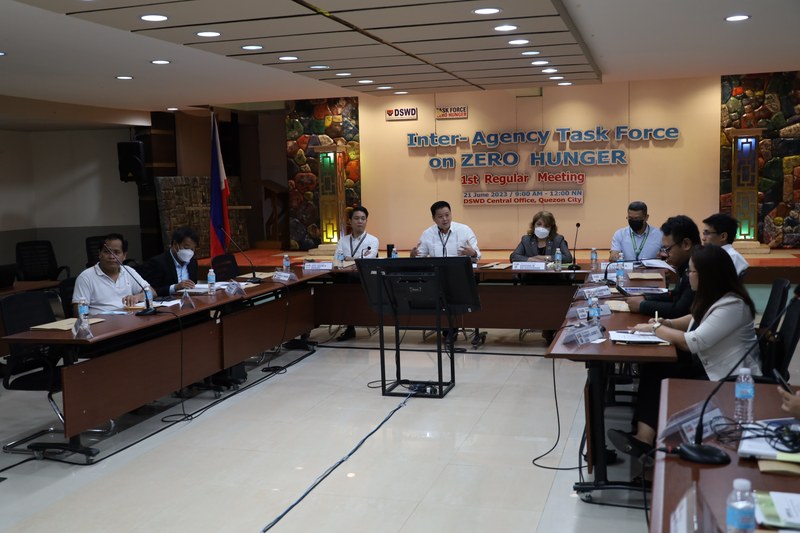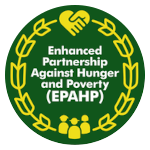
DSWD Chief Bats for Convergence of Gov’t Programs in 1st Hunger Task Force Meeting
Department of Social Welfare and Development (DSWD) Secretary Rex Gatchalian on Wednesday (June 21) presided over the first regular meeting of the Inter-Agency Task Force on Zero Hunger (IATF-ZH) as the newly-designated chairperson.
The meeting was geared at further strengthening the convergence among the IATF-ZH members, other national government agencies, the private sector, and development partners to ensure the country’s commitments to end hunger, ensure food security, and address stunting among Filipino children.
“As our ways forward, let us continue to converge our programs and services into a coalition to fight stunting,” Secretary Gatchalian stressed.
The DSWD chief reiterated the directive of President Ferdinand R. Marcos Jr. to ensure that the IATF-ZH is focused on addressing stunting and malnutrition in the first 1,000 days or from the phase of infancy up to the child’s 3rd year, through nutrition-specific and nutrition-sensitive programs.
President Marcos issued Executive Order No. 27 series of 2023, designating the DSWD Secretary as the Chairperson of the IATF-ZH.
Also attending the meeting at the DSWD Central Office were IATF-ZH co-chairperson Dr. Azucena M. Dayanghirang, who is also executive director of the National Nutrition Council (NNC), and vice-chairperson Senior Undersecretary Domingo Panganiban, represented by Director U-Nichols A. Manalo of the Department of Agriculture (DA).
During the meeting, Secretary Gatchalian presented the IATF’s nutrition continuity plan, which includes the ongoing and new programs of the DSWD to mitigate hunger and to help in the First 1,000 days campaign.
The DSWD chief made special mention of the Philippine Multi-Sectoral Nutrition Project, which aims to increase the simultaneous utilization of a package of nutrition-specific and nutrition-sensitive interventions and improve the key behaviors and practices known to reduce stunting in targeted local government units (LGUs).
Secretary Gatchalian also cited the Walang Gutom 2027 program, which will provide assistance, in the form of digital stamps worth Php 3000 food credits, to food-poor Filipino families and vulnerable sectors, including pregnant and lactating mothers.
The DSWD secretary also referred to the Pantawid Pamilyang Pilipino Program (4Ps) as an early childhood care and development intervention with beneficiaries needing to comply with the condition of bringing their children to health centers for regular check-up.
Secretary Gatchalian also directed the members of the IATF to include their existing programs in the nutrition continuity plan to ensure collective efforts in addressing stunting among children.
“Independently, alam ko na may ginawa kayong lahat (I know that all of you are doing something)… Remember, the task force’s main purpose is to work together, to tie all our programs together into a whole-of-a-nation approach. And this is what the President wants us to do,” the DSWD chief pointed out.
Members of the recalibrated IATF on Zero Hunger include the secretaries of the Department of Agrarian Reform (DAR), Department of Budget and Management (DBM), Department of Education (DepEd), Department of Environment and Natural Resources (DENR), Department of Labor and Employment (DOLE), Department of Trade and Industry (DTI), Department of Science and Technology (DOST), National Economic and Development Authority (NEDA) and Chairperson of Commission on Higher Education (CHED), as well as a representative from the Office of the President (OP).
The formulation of the National Food Policy (NFP) as a roadmap will guide in achieving Zero Hunger by 2030. The NFP is divided into six Key Results Areas (KRA) namely: KRA 1 – Review and rationalization of existing policies, rules, regulations related to the executive order; KRA 2 – Ensure available and affordable food; KRA 3 – Secure available adequacy; KRA 3 – Secure available adequacy; KRA 4 – Secure food and accessibility and safety; KRA 5 – Ensure resiliency and food stability emergencies; and KRA 6 – Ensure information, education, awareness, and people participation.
Each KRA has an assigned lead and member agency to work as a Technical Working Group.
